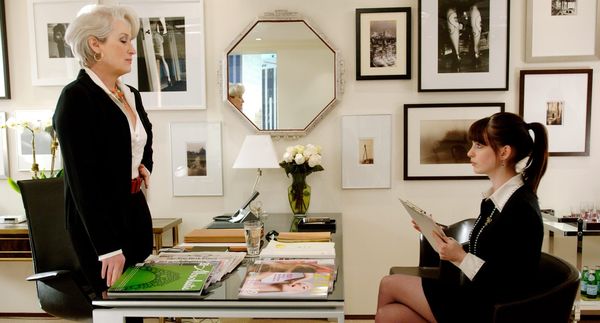 |
| The Devil Wears Prada |
This year's Glasgow Film Festival will look back at Streep's extraordinary career, its first retrospective on a living star. Highlights will include tug-of-love drama Kramer Versus Kramer, classic romance The French Lieutenant's Woman and the haunting Sophie's Choice. Yet the actress is notoriously wary about celebrations of her work, suggesting that it's dangerous to take them too seriously and that becoming a star can make it difficult to fully lose oneself in a character. Her love of interesting characters has clearly been a driving force in her career choices, though there are certain things they often seem to have in common, most notably a love of cooking. Streep herself is an enthusiastic cook but admits it is not her greatest talent.
Growing up in New Jersey as the daughter of designer Mary Wolf, Streep was always passionate about the arts and studied drama at college. Even then she was notable for her eagerness to take on challenging characters. Later she became engaged to the actor John Cazale, and when it was discovered that he was suffering from terminal cancer a role was arranged for her alongside him in The Deer Hunter. Her performance astonished everybody and won her the first of 16 Oscar nominations, whilst the film's runaway success put her on screens all across the world. Cazale died later that year and Streep struggled to balance her grief with her commitment to a suddenly meteoric career, but the complexity of her situation gradually emerged as a source of inspiration for several of the roles she would go on to play.
Her next big break came in the Woody Allen classic Manhattan. It was the first of several lesbian roles she has played, quite a gamble at the time, and it proved an object lesson in why she needed to exercise more control over the scripts she was offered; she was dissatisfied with the result, though it won her further favourable critical attention. As a consequence she was much more assertive when offered a role in Kramer Versus Kramer. The film is the story of divorcing parents engaged in an increasingly vicious battle for custody of their son. The male role was filled by Dustin Hoffman, whom Streep describes affectionately as "the greatest combination of the generous and the selfish that ever lived," (he calls her "extraordinarily hard working, to the extent that she's obsessive") but she felt that the female role was two unsympathetic and upset the balance of the film. This was a bold stance for an actress with limited experience to take, but it paid off when the script was rewritten and went on to be a massive hit, winning her multiple awards.
More were to follow. Streep would go on to win praise for her performance as The French Lieutenant's woman, playing the original Victorian heroine and an actress portraying her in a film within a film. This mirroring of past and present stories was something she would return to later in her career as a latterday counterpart of Virginia Woolf and Mrs Dalloway in The Hours. Yet her most powerful performance of the Eighties came in Sophie's Choice, a role she fought hard to get and which she proved herself equal to. The story of a concentration camp survivor who becomes involved with a troubled young man obsessed by the Holocaust, it required emotionally exhausting work, to the point where she refused to reshoot key scenes, but the result was a film of lingering power.
When Sophie's Choice was made there were very few similarly powerful roles available for women ("It's hard to negotiate the present landscape with a brain and a female body," Streep commented), but the role was also important to her because of the serious issues it addressed. Alongside her passion for acting was a strong interest in political and human rights issues. She never made any secret of being on the left and in 1983 played the union activist Karen Silkwood in a film that overtly explored themes of environmental pollution and corruption in big business. It was another controversial choice in an increasingly right wing US political climate but it once again demonstrated her flexibility as a performer. 25 years later she would take on a still more challenging political role in Rendition, but she admits that the interim character she played in the 2004 remake of classic corruption tale The Manchurian Candidate was one she enjoyed primarily because it was funny.
Given the weight of her serious roles, people often forget this lighter side to Streep, with many blindsided by her vivacious performance in 2008 smash hit Mamma Mia! But she has always loved comedy, from the gleeful slapstick of the underrated Death Becomes Her to the quirkiness of Adaptation and the no-holds-barred viciousness of The Devil Wears Prada. She has also taken risks with her sophisticated image in challenging films like Postcards From The Edge and A Cry In The Dark, bringing depth to her character in the latter case by carefully eschewing excess sentiment. All this has given her a portfolio that is one of the most diverse in Hollywood. The consequence has been that her choices have continued to widen, and now, at 61, she is one of the most sought-after acting talents around. Hers is certainly a career worth celebrating, but it seems likely she has plenty more impressive work yet to come.





















